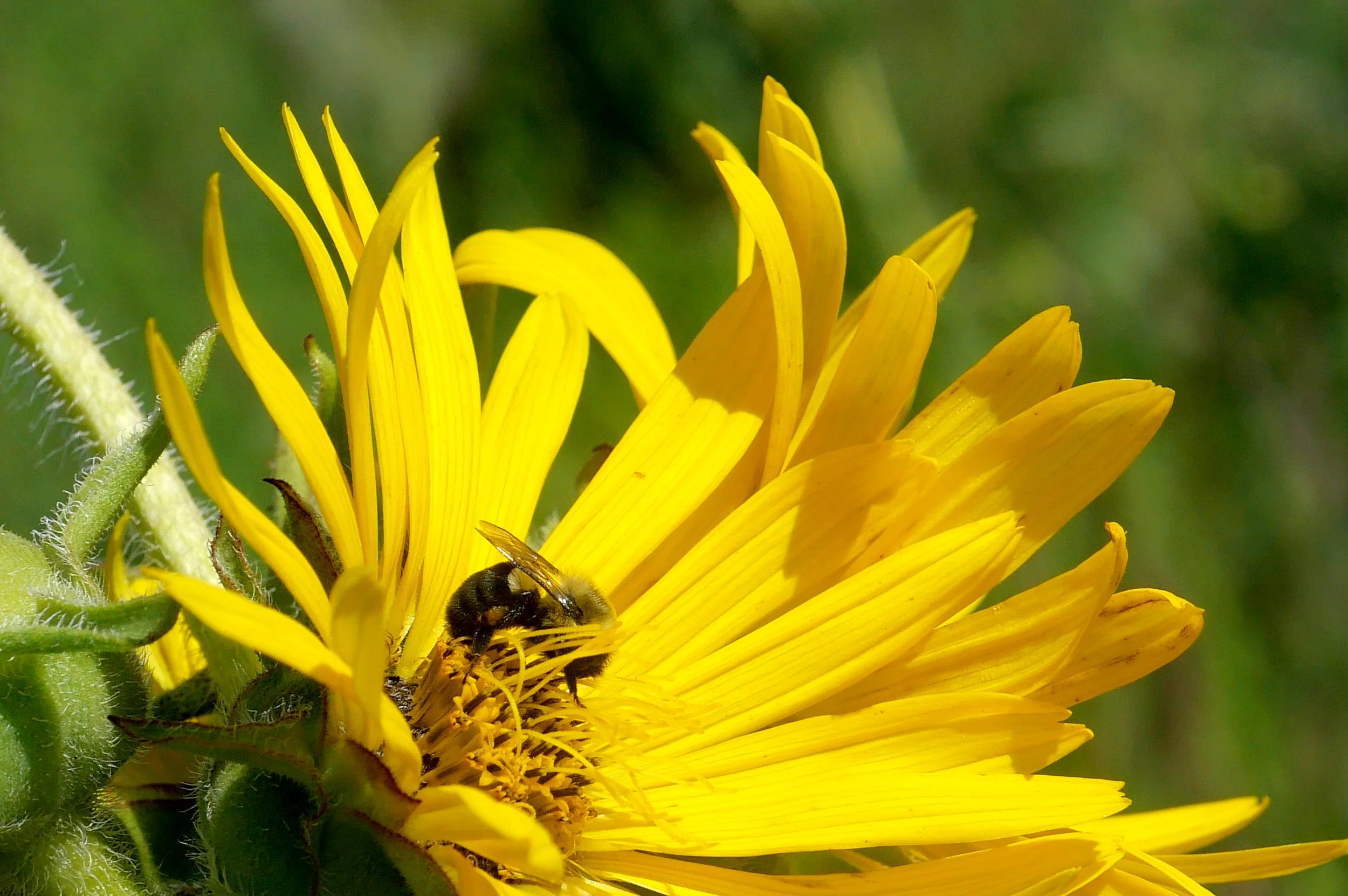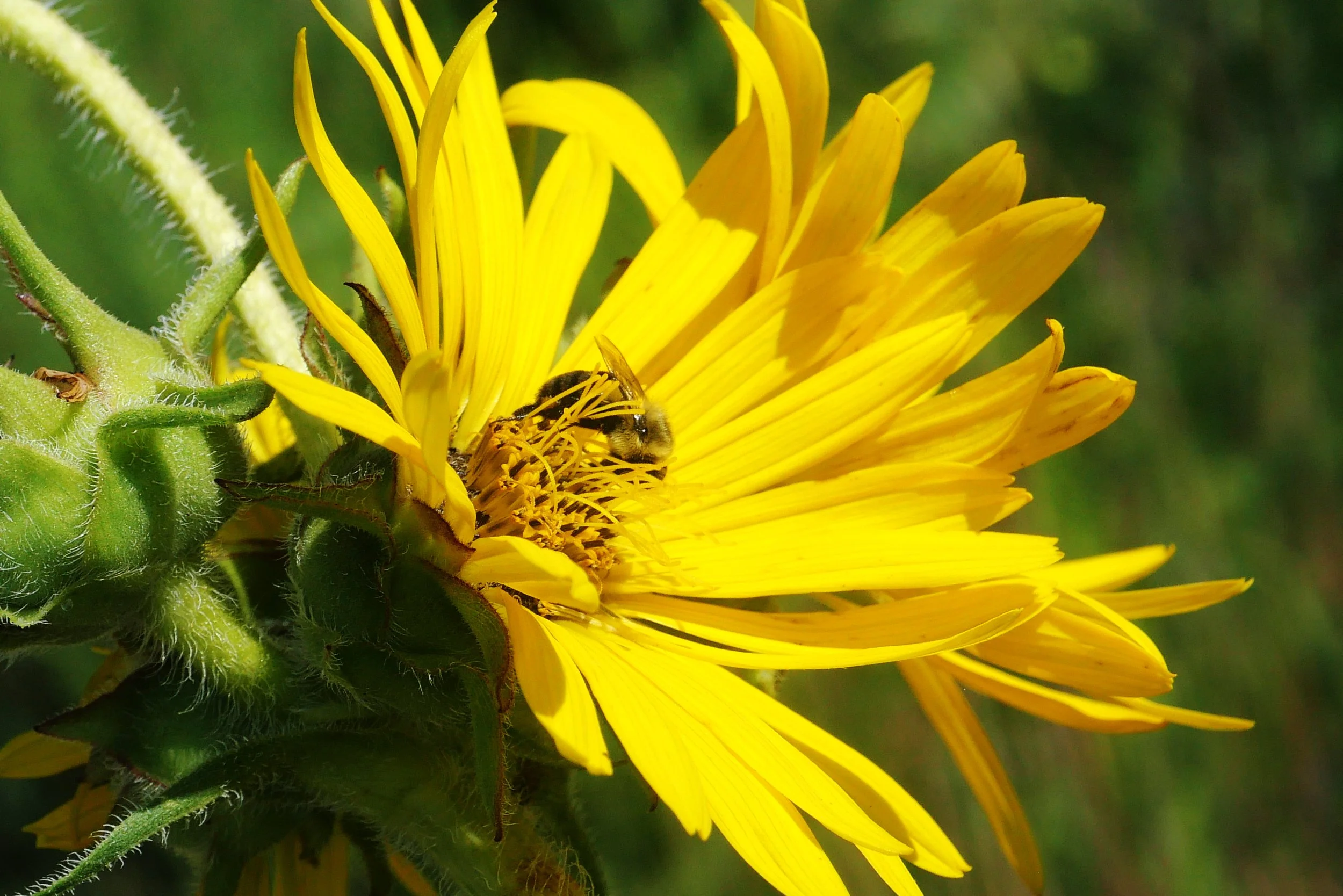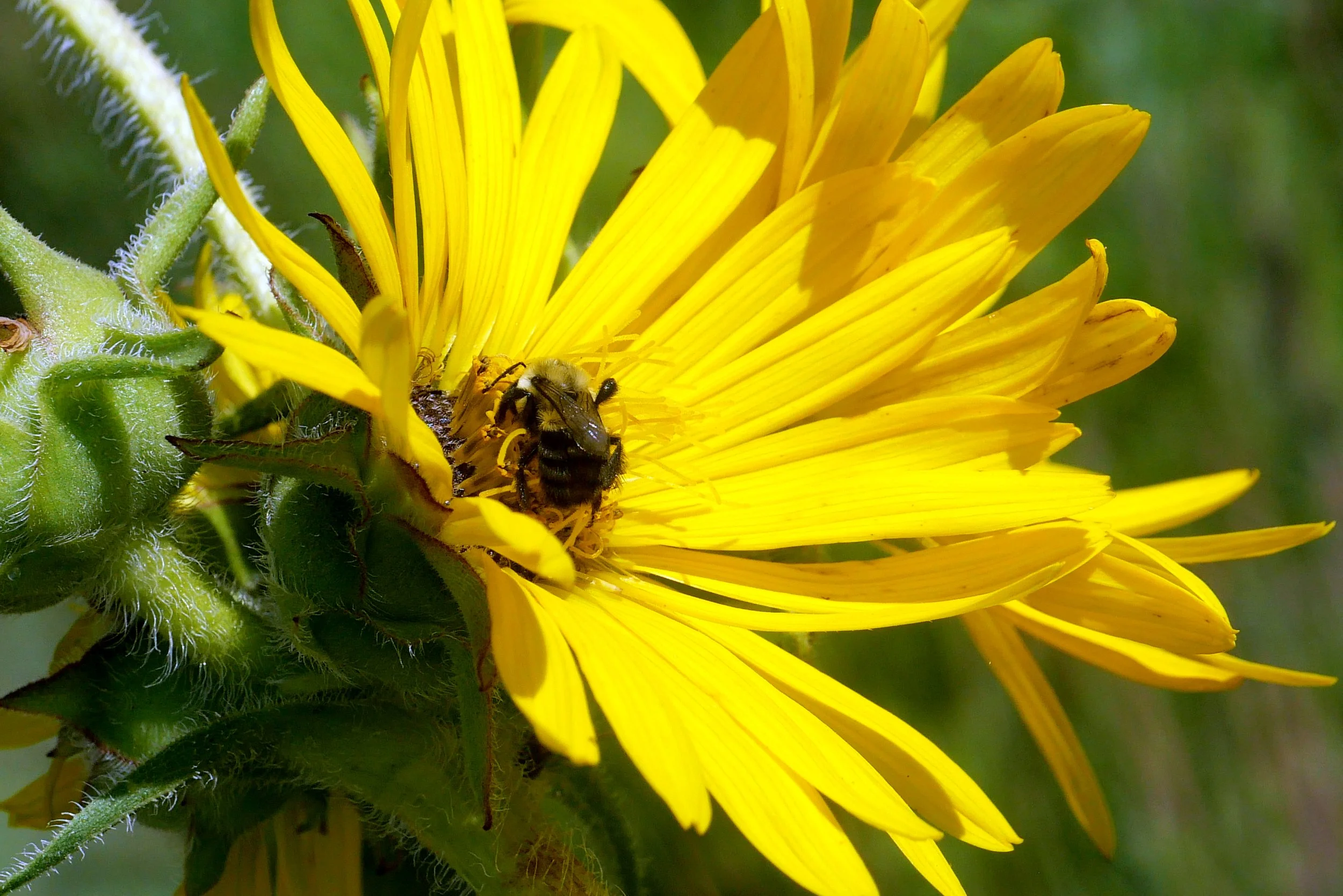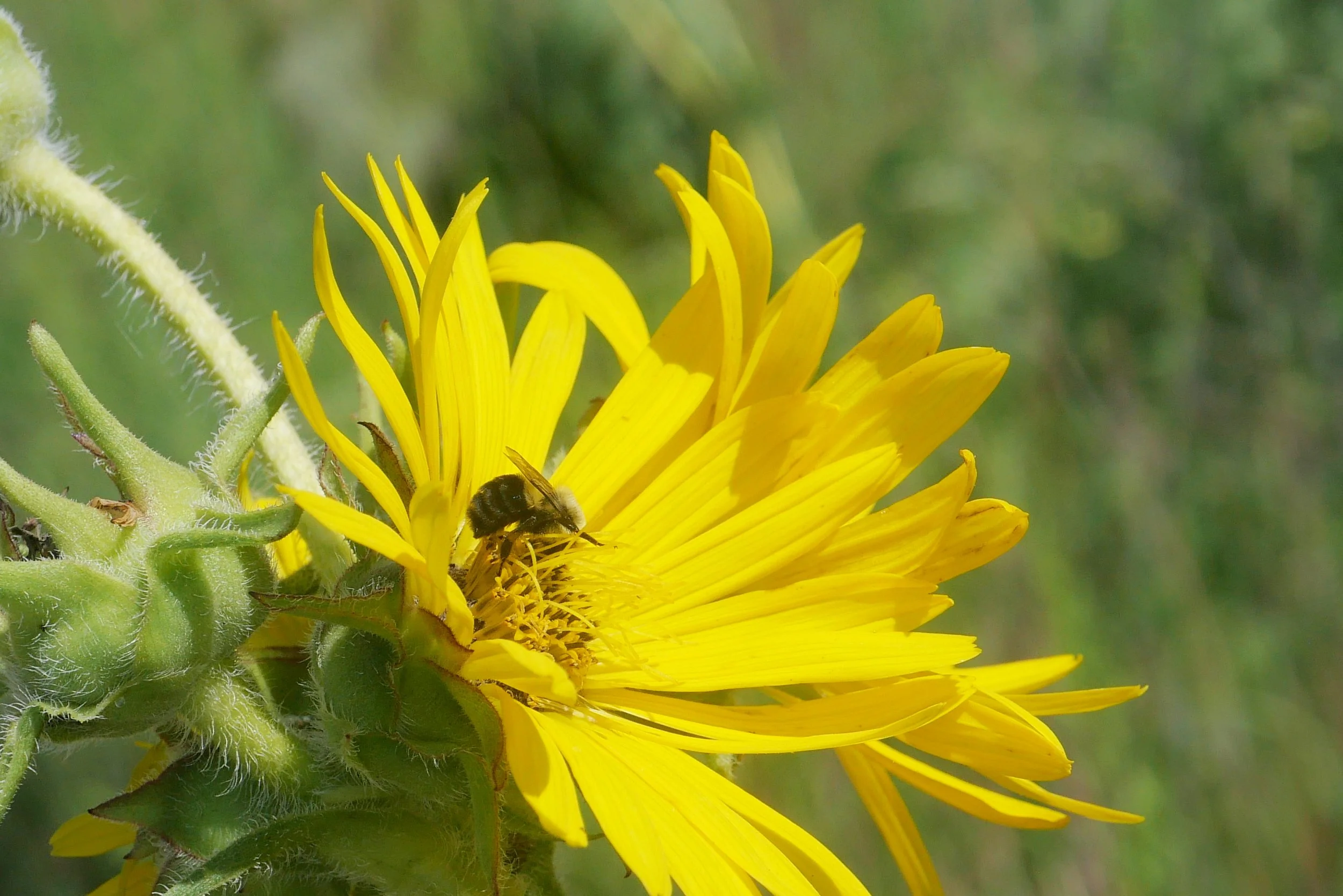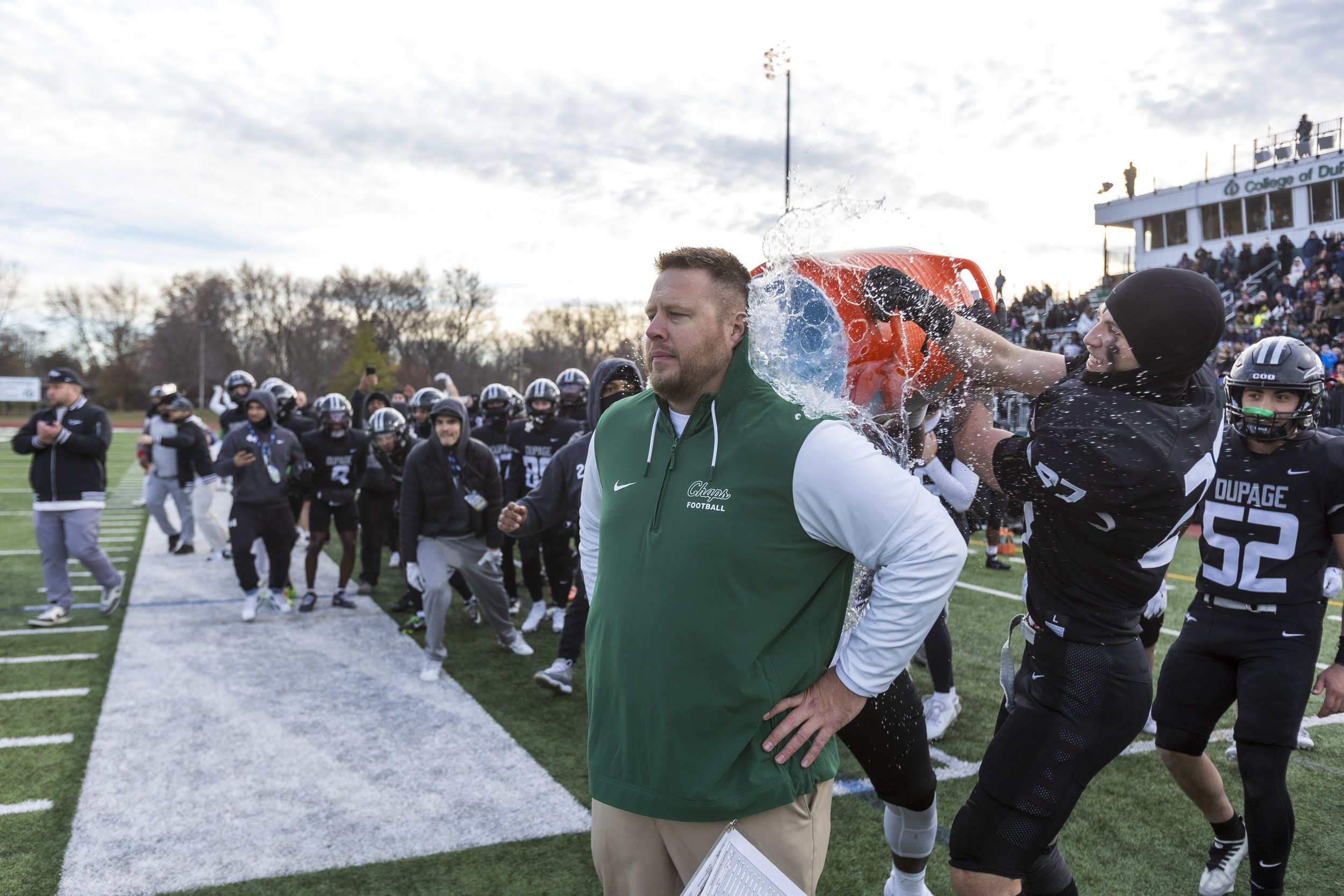Chicago, Leica D-Lux7
Summer's final act is always the most vibrant. The light gets softer, the colors seem to burn a little brighter, and there's a quiet urgency in the air. With my break coming to an end, I knew it was time to get back to work. And what better inspiration than nature's own hardest worker?
I took the Leica out for a walk, hunting for those last peaks of color. That's when I met this diligent bee, utterly immersed in its task. It was a perfect moment—a reminder that the "grind" isn't just a human concept. It's a natural rhythm. This little guy allowed me to do what I love most: to document, to observe, and to share a tiny, beautiful moment of focus.
Leica D-Lux7
Let's start with an uncomfortable truth: my rates aren't high - the baseline cost of doing professional creative work in 2025 is high. What you're really asking is why quality isn't cheap, and that's a conversation worth having.
The Real Costs You Never See
The Gear Trap
A professional camera setup today costs $8,000−$15,000
Manufacturers now expect us to replace bodies every 3-5 years
The computer needed to edit 8K video? Another $5,000
And all of this depreciates faster than a new car
The Subscription Economy
Adobe Creative Cloud: $600/year
Website hosting: $300/year
Cloud storage: $400/year
Business software: $1,000/year
Total: $2,300/year just to stay in business
The Hidden Time Tax
For every hour shooting:
1 hour pre-production (emails, planning, logistics)
hours of post-production (editing, revisions, delivery)
1 hour admin (invoicing, accounting, chasing payments)
Why Freelancers Can't Be Your "Budget Option" Anymore
Remember when companies had:
In-house photographers with benefits
Equipment budgets
Dedicated creative teams
That infrastructure didn't disappear - it just got shifted to freelancers. Now instead of paying one salary, you're paying:
My equipment costs
My healthcare
My retirement
My business expenses
This isn't inflation - this is the true cost of quality work.
The Alternative Is More Expensive
Think my rates are high? Consider:
The cost of reshoots when amateur work fails
Lost opportunities from subpar visuals
The hours your team wastes managing bad vendors
Good creative work isn't an expense - it's an investment that pays for itself.
The Bottom Line
I don't set prices based on what I wish I could charge. I set them based on what it costs to:
Deliver professional results
Maintain reliable equipment
Stay in business next year
You're not just paying for what I do - you're paying for what I've done:
10,000 hours of solving problems before they become your problems.
At the end of the day, this isn’t about finding the cheapest option—it’s about finding the right partner. Someone who:
✔️ Shows up prepared (so you don’t have to manage the process)
✔️ Delivers consistent quality (so you look as professional as you are)
✔️ Will still be here next year (so your branding stays cohesive)
The best projects start with an honest conversation. Let’s discuss:
What you truly need (not just what fits an arbitrary budget)
How we can maximize your investment
Why working with an experienced pro saves you time and stress
I’m not just selling photos/videos—I’m offering peace of mind. Let’s talk about how to make your vision real.
"Part Two: The Balance of Client Work & Personal Vision
📸 Canon: The backbone—delivering clean, crisp, client-ready images every time. (I take their trust seriously.)
🎞️ Leica: The creative escape—where I play with light and moments between shots.















(Yes, I sometimes share Leica frames, but my Canons ensure the job gets done right.)
Two tools, one mission: excellence for them, joy for me.
Last week, I had the privilege of documenting the AACR (American Association for Cancer Research) Conference at Chicago’s sprawling McCormick Place. For those who’ve shot large-scale events, you know the drill: fast-paced keynote sessions, candid networking moments, and the quiet intensity of researchers sharing breakthroughs—all under the glow of convention-center lighting.
As a photographer, my job was to capture the energy and nuance of the event for AACR’s team. But even in the chaos of back-to-back sessions, I held tight to my personal rule:
"Yes, I’ll shoot that for you… but I’m shooting one for me, too."
Conference photography can be relentless. Between adjusting for mixed lighting and nailing fleeting expressions, it’s easy to become a machine—clicking for the client, but not for the craft. That’s why I always sneak in frames for myself: a sliver of sunlight through the exhibit hall, an attendee’s unnoticed smile, or the abstract geometry of the venue itself.
This time, my Leica D-Lux 7 was my sidekick for these personal snaps. Its compact size let me stay agile, and that iconic Leica rendering turned even mundane details into keepers.
Shot with Leica D-Lux 7
Next door to me, there’s a small patch of daisies—and one unexpected tulip—that’s quietly blooming for what may be the last time.
The property is vacant now. Soon, it’ll be transformed into yet another McMansion, erasing what little is left of its past. I took this photo not just for the beauty, but because I know I may never see this simple, natural arrangement again.
This yard holds more than flowers. It holds a story. A few years ago, a neighbor and I found the homeowner, Dave, lying at the bottom of his stairs. He had fallen and broken his neck. He passed away from those injuries not long after. The home now belongs to a realtor.
The flowers were planted decades ago by Dave’s mother, long before I moved into the neighborhood. I’ve been told she kept an immaculate yard—flowering trees, seasonal blooms, everything in its place. After she passed, Dave did his best, but it became overwhelming. Some said he had developmental issues; I don’t know for sure, but I do know he was misunderstood by many.
It took me three years to break the ice with Dave. During the pandemic, we finally had some conversations. He even let me help him clean up the yard a few times. It meant something—to both of us, I think.
Now, this patch of flowers, stubborn and beautiful, is all that remains of that story. Of Dave. Of his mother. Of what once was.
From 2014 to 2021, I had one of the most exhilarating jobs imaginable: I was an aerial photographer for energy companies. Every week, I’d soar through the skies, capturing stunning photos and collecting critical data. The pay was great, but there was a reason for that—the job came with significant risks. Over the years, I faced my fair share of close calls: a window blowing out on a freezing 20-degree day, the oil light flickering on mid-flight, forcing us to abort missions and rush back to safety. But nothing could have prepared me for February 27, 2020—the day that changed everything.
It started like any other workday. My pilot, Jake, was at the helm, calm and focused as always. I was in the back, setting up my gear, mentally preparing for the shoot. Then, the unthinkable happened. A loud, insistent beep pierced the air: “Beep, Beep, Beep.” Suddenly, the rotors fell silent. The once-familiar hum of the helicopter was gone, replaced by an eerie quiet. If you’ve ever spent time around pilots, you know they’re masters of composure. But even Jake’s stoic demeanor couldn’t mask the gravity of the situation. As the helicopter began to plummet from 1,500 feet, I panicked. Jake’s response was blunt but understandable: “Shut up.”
We were falling fast, and I was certain we were about to crash into a dense forest below. Miraculously, Jake managed to steer us away from the trees. But our relief was short-lived. On the other side of the forest was a frozen retention pond. I can’t swim, and my mind raced with the horrifying thought of plunging into icy water. As the ground rushed toward us, I closed my eyes. I didn’t want to witness my own death.
The impact was brutal. My body clenched so tightly that the force of the landing sent shockwaves of pain through me. When I opened my eyes, everything was white. For five agonizing seconds, I couldn’t see anything but that blinding whiteness. It wasn’t until later that I realized why: a blizzard had swept through the area earlier that week, leaving the field covered in a pristine, untouched blanket of snow. As my vision cleared, I saw it: a scoreboard. We had landed in a little league baseball field in Stickney, Illinois. Jake and I locked eyes, and in that moment, we both screamed, “We’re alive!” We high-fived, laughed, and celebrated like we’d just won the World Series. Against all odds, we had survived.
That day didn’t just change my life—it transformed my entire perspective. I learned that not all money is worth the risk, especially when it comes at the expense of time—the most precious resource we have. Time with my family—my wife, kids, parents, siblings, cousins, aunts, uncles, friends, and even my dog—has become my greatest joy. None of them know it, but every moment I spend with them fills me with gratitude.
One month before my crash, Kobe Bryant tragically lost his life in a helicopter accident. His death was a stark reminder of how fragile life is, and it brought unexpected media attention to my own crash. That attention, oddly enough, opened a door for me to reconnect with loved ones I hadn’t spoken to in years. It was a silver lining in an otherwise harrowing experience.
So, here’s what I’ve learned: Life is unpredictable, and time is the one thing we can never get back. I’m grateful for every second I have, for the people who fill my life with love, and for the experiences—both good and bad—that have shaped me. If there’s one thing, I hope you take away from my story, it’s this: Cherish your time. It’s the only currency that truly matters.
There’s something about the red in this photo that always draws me in. The bold splash of color against the backdrop of golden and green foliage feels almost intentional—like nature itself decided to highlight this perfect moment.
I’ve photographed this location many times, yet it never fails to evoke a sense of romance. Maybe it’s the peaceful reflection on the water, the soft morning light, or the quiet stillness that surrounds it. This spot holds a timeless charm, a place where seasons change but the feeling remains the same.
On this particular day, the air was crisp, and the warm glow of the sun bathed everything in a golden hue. The boats, docked and waiting, added to the nostalgia—reminding me of slow, lingering moments by the water. It’s a scene that invites you to pause, breathe, and simply take in the beauty of the moment.
Photography is often about capturing not just what we see, but what we feel. And in this frame, I feel warmth, tranquility, and just a hint of romance.
Do you have a favorite place that gives you that same timeless feeling?
Leica D-Lux 7






Recently, I had the opportunity to cover the back-to-school event for the staff, and it was an eye-opening experience. The theme, Embracing the Future and AI, couldn’t have been more timely. As someone who’s always curious about the intersection of technology and creativity, I was thrilled to be in the room for this discussion.
The event was a deep dive into how artificial intelligence is shaping the way we work, learn, and create. From streamlining tasks to enhancing creativity, AI is no longer just a buzzword—it’s a tool that’s becoming increasingly integrated into our daily lives. But what stood out to me the most was the emphasis on how we use these tools, rather than letting them use us.
One of the key takeaways was the importance of maintaining a balance. AI can be incredibly powerful, but it’s essential to stay in the driver’s seat. We explored practical ways to leverage AI for productivity and innovation while staying true to our unique human touch. After all, technology is at its best when it complements our skills, not replaces them.
As a photographer and storyteller, I couldn’t help but think about how AI is transforming the creative industry. From editing tools to content generation, the possibilities are endless. But the heart of any great story or image still lies in the human experience—the emotions, the perspectives, and the moments that only we can capture.
The perks of covering events like this go beyond the photos I take or the stories I share. It’s about the knowledge I gain and the connections I make. This event reminded me that the future isn’t something to fear; it’s something to embrace, understand, and shape.
I left the event feeling inspired and equipped with new tools to navigate this ever-evolving landscape. Whether you’re an educator, a creative, or simply someone curious about the future, the message was clear: AI is here to stay, and it’s up to us to use it wisely.
Here’s to embracing the future—one click, one idea, and one lesson at a time.
Photographing College of DuPage (COD) football is an exciting blend of fast-paced action and creative artistry. From the roar of the crowd to the intensity on the field, every moment tells a story waiting to be captured.
Preparation is Key
Understand the game, scout the field, and bring the right gear, like a fast telephoto lens for action shots and a wide-angle lens for the atmosphere. Arrive early to find the best vantage points.
Techniques for Capturing the Action
Focus on Faces: Emotion adds depth to your shots.
Freeze the Action: Use a fast shutter speed—1/1000 or faster—for crisp, clear shots.
Play with Angles: Low or high angles can make your images stand out.
Anticipate the Play: Position yourself where the action is likely to unfold.
Capturing the Atmosphere
Document more than just the field action—crowds, halftime performances, and quiet moments add depth to the story.
Post-Processing for Impact
Enhance your images by adjusting exposure, contrast, and color. Crop and sharpen selectively to highlight key details.
The Reward
Photographing COD football preserves memories and celebrates the game’s spirit. Your work becomes a cherished part of the COD community’s story, inspiring and connecting fans and players alike.
In the world of photography and media production, the value of a dependable and talented production team cannot be overstated. Success in this business is rarely achieved in isolation; it requires a network of skilled individuals working together seamlessly to bring creative visions to life. As someone who has navigated the challenges and rewards of this industry for years, I can confidently say that identifying and nurturing talent within your team is one of the smartest investments you can make.
The Power of Collaboration
At its core, a production team is a collective of individuals with diverse skills and perspectives, united by a common goal: to produce exceptional work. Whether it’s a high-pressure event shoot, a corporate project, or an ambitious artistic endeavor, a solid team can transform an idea into a stunning reality. Each member—from photographers and videographers to editors and project managers—plays a pivotal role in ensuring the final product meets or exceeds expectations.
Recognizing and Supporting Talent
The first step in building a strong team is identifying talent. Look for individuals who not only excel in their craft but also share your passion for storytelling and quality. These are the people who will go the extra mile, bringing creativity and dedication to every project. Once you’ve found them, support them. Provide opportunities for growth, encourage their ideas, and create an environment where they can thrive.
The Long-Term Benefits
Investing in your team isn’t just about the immediate project at hand; it’s about building a foundation for long-term success. A cohesive, well-supported team creates consistency in your work, fosters trust among clients, and enhances your reputation in the industry. Over time, this translates into more business opportunities and a stronger foothold in the competitive world of media production.
Growing Together
When you invest in your team, the returns are mutual. As your business grows, so do the careers and skills of your team members. This dynamic creates a sense of loyalty and pride within the team, making everyone more invested in the success of the business. It’s a cycle that not only benefits your company but also contributes to the overall growth of the creative industry.
Final Thoughts
In this fast-paced, ever-evolving field, no one succeeds alone. The strength of your production team is directly tied to the strength of your business. Identify talent, nurture it, and watch your team—and your business—reach new heights. In the end, a solid team isn’t just an asset; it’s the heart of your success.
Let’s get this out of the way: I’m a dad, a photographer, and I have ADHD. The apple didn’t just fall from the tree—it rolled into chaos, sprouted wings, and flew off. But hey, that’s life, right?
This summer, my oldest son Jonas turned 15, which meant it was time for him to get a job. I figured the best way to teach him about work—and about handling ADHD—was to bring him along on my gigs. Two birds, one camera.
Now, let me tell you, I once tried the whole corporate cubicle thing. Big mistake. Sitting still all day? Torture. I started taking “bathroom breaks” just to move around, which my boss didn’t love. Meanwhile, the smokers took ten breaks a day, so I joined them—without a cigarette—just to breathe some fresh air… well, secondhand fresh air. Thankfully, photography saved me, and I’ve been thriving ever since.
Back to Jonas. I had all these visions of us bonding over basketball, music, and spicy food. Turns out, my guy hates sports, thinks my playlists are cringe, and runs from anything remotely spicy. But we do share a love of history and storytelling, so there’s that.
When I took him to work, it started off rocky. At one job, he literally fell asleep on a public couch. A client asked if my “co-worker” had a rough night. I thought, “This is a disaster.” But instead of giving up, I handed him a camera and told him to go create. And boy, did he deliver.
At just 15, Jonas is already better than I was at his age. I took him to a cooking competition, and he nailed every shot—finding angles I didn’t even think of. He wasn’t copying me; he was carving out his own style. Watching him grow as a photographer made me prouder than I can put into words.
Photography saved me—it’s let me travel, meet incredible people, and work in ways that actually fit my ADHD brain. Now I hope Jonas can find his own path, whether it’s in photography or somewhere else. Either way, I’ll always have his back… just as long as he stays off public couches.
Recently, I had the opportunity to photograph the annual George Macht Food Scholarship Competition at the College of DuPage. This prestigious event brings together aspiring young chefs from across the region, offering them a chance to showcase their culinary skills and compete for scholarships that support their passion for the culinary arts.
Throughout the day, contestants presented an array of impressive dishes, from savory courses to exquisite desserts. In addition to the main culinary competitors, talented pastry chefs participated, demonstrating their mastery of techniques, flavors, and presentation. The energy in the kitchen was inspiring as these dedicated chefs worked with precision and creativity, striving to impress the panel of judges.
Capturing the moments at this event was an absolute pleasure. Here are some of the highlights from this year’s competition – a celebration of the hard work, talent, and artistry that these young chefs bring to the culinary world.
This past weekend, I had the opportunity to attend and photograph the American Academy of Ophthalmology (AAO) conference in the heart of Chicago. Armed with a Canon R3, I immersed myself in the vibrant atmosphere of the conference halls and exhibit spaces, capturing the energy and essence of this world-class event.
This past weekend, I had the opportunity to cover the American Academy of Ophthalmology (AAO) conference in Chicago. It was an exciting few days filled with new experiences, both at the conference and exploring the city. My hotel was conveniently located next to the iconic AON building, so I couldn't resist taking a few minutes to wander around and capture the unique architecture. There's something mesmerizing about Chicago's skyscrapers, and the AON building never disappoints. The conference itself was held at McCormick Place, a massive venue that offers a perfect view of Lake Michigan. I made sure to get up early one morning to catch the sunrise over the lake, and it did not disappoint. The soft, golden light reflecting on the water was worth the early alarm. In between conference sessions, I found myself exploring more of the city. I finally got a chance to check out the Lowes Hotel, which had been on my list for a while. The sleek design and stunning views added an extra touch of luxury to my weekend. Overall, it was a whirlwind of work and exploration. Chicago never seems to run out of inspiration.
Recently, I had the opportunity to photograph the College of DuPage Football Media Day, and what a day it was! It’s always exciting to capture athletes at the peak of their game, but media day portraits bring something different to the table. This wasn’t about the fast-paced action on the field; instead, it was a chance to focus on the individuals who make up the team.
In a studio-like setup, I had the players step in front of the camera, one by one. The goal was to capture not just their strength and athleticism, but also their personalities. Each portrait needed to reflect who they are off the field as much as who they are on it. It’s a moment to showcase their confidence and pride while giving each athlete their time to shine.
Working in this controlled environment allowed me to play with lighting and composition, highlighting the sharp contrasts between the players’ intensity and the quieter moments when they relaxed in front of the lens. These are the moments I love most—the space between the tough exterior and the person behind the helmet.
Media days like these are a great reminder that while football is a team sport, each player brings their unique energy to the field. Being able to capture that in a portrait is a challenge I always welcome. As always, it was an honor to be part of the College of DuPage’s season kickoff and to give the athletes something they can look back on as they take on the season ahead.
Elizabeth Smart Book Event at the College of DuPage's McAninch Art Center in Glen Ellyn, IL. An inspiring evening as Elizabeth Smart shared her powerful story and insights with the audience.







